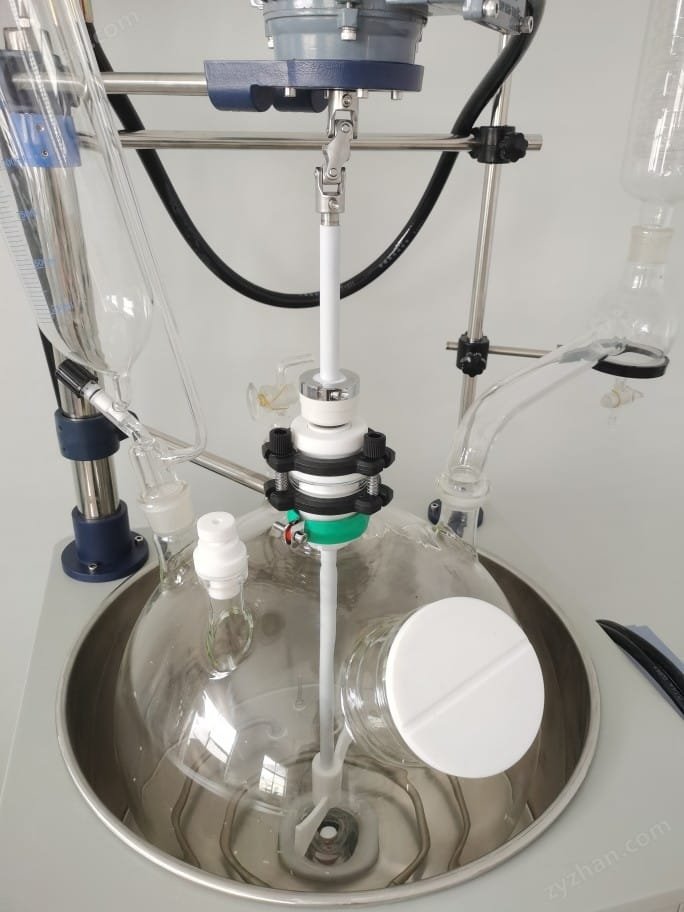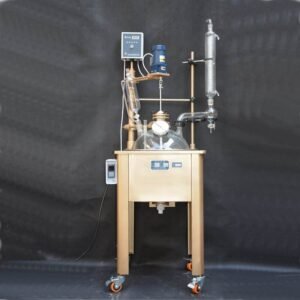Organic chemistry is a fundamental branch of chemistry that deals with the study of carbon-containing compounds and their reactions. Researchers and scientists working in organic chemistry require specialized equipment to carry out precise experiments and obtain reliable results. One of the most essential pieces of equipment for organic chemistry research is the Single Glass Reactor for Organic Chemistry. This versatile piece of laboratory apparatus enables chemists to perform chemical reactions under controlled conditions, making it crucial for achieving accurate and reproducible results.

What is a Single Glass Reactor for Organic Chemistry?
A Single Glass Reactor for Organic Chemistry is a specialized laboratory vessel used to conduct chemical reactions, particularly in organic synthesis. It is designed to provide controlled temperature, pressure, and stirring during experiments. The reactor is typically made of high-quality borosilicate glass, which offers excellent thermal and chemical resistance. This makes it ideal for a wide range of chemical processes, from simple syntheses to more complex reactions requiring precise conditions.
The Single Glass Reactor for Organic Chemistry is equipped with several features to ensure smooth operation. These include a jacketed design for heating or cooling, a stirrer to ensure even mixing of reactants, and a condenser to control vapor during distillation. Some models, like the 3L Glass Reactor with Oil Bath, even come with an oil bath to maintain stable temperatures throughout the reaction process. This makes it an indispensable tool for chemists working in the lab.
Benefits of Using a Single Glass Reactor for Organic Chemistry
- Precise Temperature Control: One of the most important factors in organic chemistry reactions is temperature control. The Single Glass Reactor for Organic Chemistry allows researchers to maintain a consistent temperature throughout the reaction process. With its heating and cooling features, chemists can easily adjust the temperature to suit the specific requirements of the reaction, ensuring optimal results. Maintaining precise temperature control also reduces the risk of unwanted side reactions and improves the yield and purity of the product.
- Efficient Stirring and Mixing: The Single Glass Reactor for Organic Chemistry comes equipped with a stirrer that ensures thorough mixing of reactants. This is particularly important for reactions involving multiple components or those that require uniform heat distribution. Efficient stirring promotes better interaction between the chemicals, which can lead to faster reactions and more consistent results. By controlling the stirring speed, researchers can also influence the rate of the reaction.
- Versatility in Applications: The Single Glass Reactor for Organic Chemistry is versatile and can be used for a variety of organic synthesis reactions. Whether it’s for simple esterifications, complex polymerizations, or more intricate organic transformations, this reactor provides the flexibility needed for diverse applications. Researchers can also use the reactor for distillation, extraction, and crystallization, making it a multi-functional piece of equipment for organic chemistry labs.
- Safe and Controlled Reactions: Organic chemistry experiments often involve volatile chemicals or reactions that generate heat. The Single Glass Reactor for Organic Chemistry ensures that these reactions are carried out safely by providing controlled conditions. The jacketed design allows for safe heating or cooling, and the condenser helps manage any vapors produced during the reaction. Furthermore, many reactors come with built-in safety features such as pressure relief valves and explosion-proof designs, reducing the risk of accidents.
- Increased Productivity and Efficiency: With the ability to perform reactions under highly controlled conditions, the Single Glass Reactor for Organic Chemistry increases the efficiency of experiments. By reducing the time required for reactions and minimizing the risk of errors, researchers can achieve better productivity. Additionally, the reactor’s ease of use and automatic features allow for higher throughput in a laboratory setting, enabling chemists to conduct multiple experiments simultaneously.
Key Features to Look for in a Single Glass Reactor for Organic Chemistry
When selecting a Single Glass Reactor for Organic Chemistry, there are several features to consider. These features directly impact the reactor’s performance, safety, and usability in the laboratory.
- Size and Volume: Depending on the scale of your experiments, it’s important to choose a reactor with the appropriate size and volume. Whether you are conducting small-scale reactions or scaling up to larger ones, the right volume ensures efficient use of materials and better reaction control.
- Heating and Cooling Jacket: A high-quality reactor should include a jacketed design that allows for both heating and cooling. This feature is crucial for maintaining stable reaction temperatures and for controlling exothermic or endothermic reactions.
- Stirring Mechanism: The reactor should have a reliable stirring system that can provide consistent agitation. Some reactors also offer adjustable stirring speeds to accommodate different types of reactions.
- Condensing System: For reactions that involve distillation, a good condensing system is essential. A Single Glass Reactor for Organic Chemistry should include a condenser that effectively manages the vapor produced during the reaction, ensuring the recovery of valuable chemicals.
- Safety Features: Safety is paramount in any laboratory setting. A reactor should include pressure release valves, explosion-proof glass, and other safety features to protect both the researcher and the equipment.
Applications in Organic Chemistry
The Single Glass Reactor for Organic Chemistry is widely used in various applications within the field of organic chemistry. Some of the most common applications include:
- Synthesis of Organic Compounds: Whether you are synthesizing small molecules or complex polymers, the Single Glass Reactor for Organic Chemistry provides the ideal environment for these reactions. By controlling temperature and mixing, researchers can achieve high yields and high-purity products.
- Distillation and Separation: The reactor’s ability to manage temperature and vapor makes it ideal for distillation processes. It allows for the separation of compounds based on their boiling points, which is essential for purifying organic substances.
- Polymerization Reactions: Organic chemists often use Single Glass Reactor for Organic Chemistry to carry out polymerization reactions, which require precise temperature and mixing controls to produce the desired polymer structure.
- Pharmaceutical Research: In pharmaceutical development, where the synthesis of active ingredients requires stringent control over reaction conditions, the Single Glass Reactor for Organic Chemistry is a critical piece of equipment. It ensures that pharmaceutical compounds are synthesized with the required purity and consistency.
Why Choose EquilRxnLab for Your Single Glass Reactor Needs?
For those in need of a reliable and efficient Single Glass Reactor for Organic Chemistry, EquilRxnLab offers some of the best solutions in the market. Our 3L Glass Reactor with Oil Bath provides excellent temperature control, efficient stirring, and safety features for various organic chemistry applications. You can explore more about our products here.
For the latest updates, product demonstrations, and detailed information, follow EquilRxnLab on YouTube, Instagram, and Facebook.
For inquiries or further details, feel free to contact us via our Contact Us page.
This article emphasizes the significance of Single Glass Reactor for Organic Chemistry in modern research. By providing an in-depth look at the reactor’s features and applications, it aims to help researchers make informed decisions when selecting the right equipment for their laboratories. Whether you’re conducting routine synthesis or complex organic transformations, investing in a high-quality Single Glass Reactor for Organic Chemistry can greatly improve your experimental outcomes.



